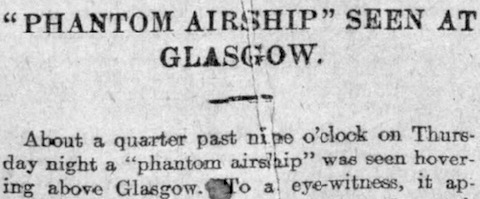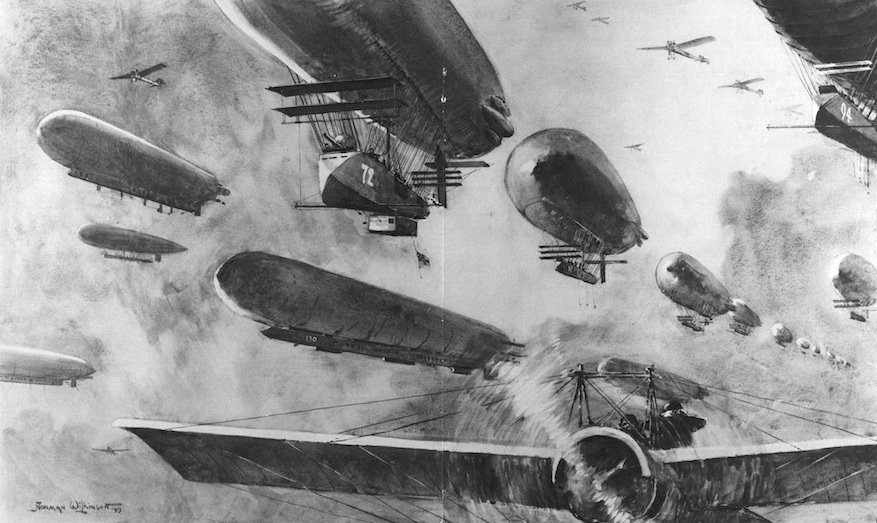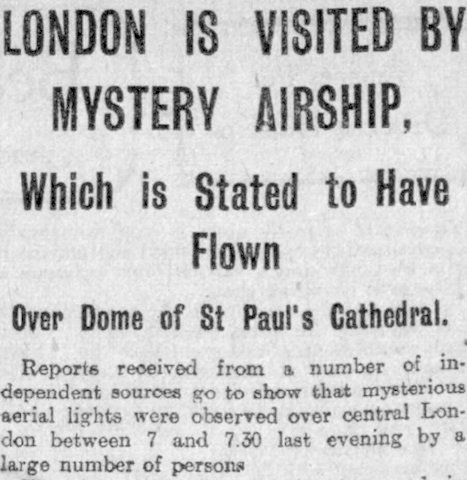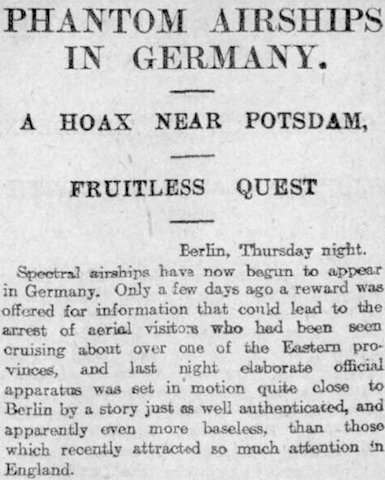
Here’s a rarity these days: an actual phantom airship report, from the Aberdeen Daily Journal (p. 5):
About a quarter past nine o’clock on Thursday night [20 March 1913] a ‘phantom airship’ was seen hovering above Glasgow. To a eye-witness, it appeared at first to be a star of unusual magnitude and brilliance. After watching the object for about ten minutes, however, during which it moved rapidly to the north-west, he was convinced that it was not a star, and, drawing the attention of three other gentlemen, they also observed it for a considerable time, and came to the conclusion that it was an airship of some description. During a period of fifteen minutes it three times disappeared for about two minutes each time, and the watchers formed the opinion that it was being manœuvred in a circular course. Occasionally it appeared to be a balloon with a car underneath, and this impression was strengthened by what seemed to be the rays of a searchlight streaming from the car. At intervals for about three-quarters of an hour the object was plainly visible, and ultimately it disappeared in a northerly direction. The atmosphere was clear, and the gentlemen were satisfied that the moving object was some form of balloon.
No other paper picks up the Glasgow story. The Leitrim Observer, for some reason, sees fit to choose this day to inform its readers that ‘the airship scare at Grimsby’ has been put to an end by the discovery of a box kite used by hoaxers, though most other newspapers reported this more than two weeks ago (p. 7).
The Berlin correspondent of the Economist, after reporting on the state of Germany’s politics and markets, analyses the health of its airship industry and finds it to be surprisingly poor (p. 707):
Thanks to the inventions of Count Zeppelin, Major Parseval, and Major Gross, Germany heads the world in the field of airships. But, however successful this advantage has been in creating panic across the North Sea, it has not yet been able to make the construction of airships a profitable industry in Germany itself.
This is partly because the German government won’t allow ‘certain types of airships’ to be exported, though both Siemens-Schuckert and Clouth have closed their airship concerns and ‘they have both worked on private account alone’. Zeppelin itself ‘is still (as it has always been) in great difficulties’: the National Zeppelin Fund, which consisted of ‘four and a-half million marks collected for it a few years ago’, has run out and Delag, Zeppelin’s airline founded three years ago, has made ever-bigger losses ‘since every year has brought the destruction of at least one airship’. But at least Zeppelin is now getting a subsidy from the German Army ‘in return for a promise that no Zeppelin vessels shall be supplied to foreign Powers’. Of the other airship constructors, Maybach and the ‘Airship Hall Construction Company’, both Zeppelin subsidiaries, ‘are both closely associated with the success and difficulties of the original works’; Parseval had to reduce its capital by 80% last year and, having obtained permission to do so, is feverishly exporting to ‘Japan, Russia, Austria, and England’; and Schütte Lanz has so far ‘produced only one vessel’, though the Army has ordered another.
It is clear that if the German airship industry is to exist at all prices will have to be raised, and in any case it is unlikely that for a long time to come it will do more than construct for military and naval needs.
In Britain, however, aircraft manufacturers can’t even count on government orders. The Dreamer, author of Flight‘s ‘Armchair reflections’ column, says that they ‘are, many of them, hanging on by a handful of moss, and unless something crops up very soon some of them will have to drop out before the orders arrive’ (p. 343). This is not just their problem, however, but the nation’s:
With all these airships floating about every night one never knows what might happen. I should not be at all surprised to wake up one morning to find somebody had been over in the night and gone off with England. No doubt we shall come along with a fleet of aircraft in time, but we might be a day behind the fair.
‘We appear to be at peace with all the world just now, but appearances are sometimes deceptive.’
![]() This work is licensed under a Creative Commons Attribution-NonCommercial-NoDerivatives 4.0 International License.
Permissions beyond the scope of this license may be available at http://airminded.org/copyright/.
This work is licensed under a Creative Commons Attribution-NonCommercial-NoDerivatives 4.0 International License.
Permissions beyond the scope of this license may be available at http://airminded.org/copyright/.



